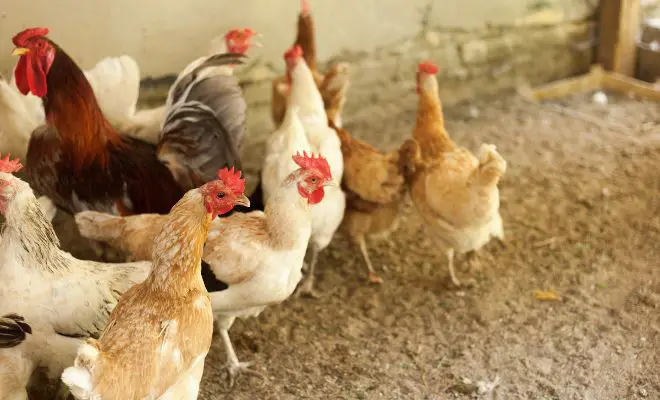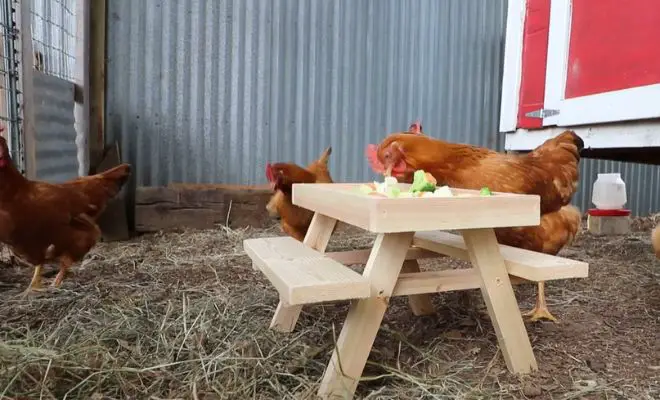Should I Free Range My Chickens? Up to You!

Ah, the age-old dilemma for every chicken keeper – to free range or not to free range? It’s a question that has sparked many debates, with both sides passionately defending their stance. But before we dive into the pros and cons, let’s address the elephant in the room.
Well, to me, free-ranging chickens isn’t a wise decision. There are predator attack risks, or the chickens might be lost, or being thieved. But at the same time, it’s quite an unfair call to keep them in a congested place and not allow them to roam for at least a little while every day. The decision is basically up to the chicken owners.
I’ll try to catch up with ideas that’ll help you make your own decision. Also, try to break down the ice on certain stereotypes about free-ranging chickens. Keep on reading!
Table of Contents
Why Shouldn’t I Free Range My Chickens?

This should be a storytelling stuff. A flock of chickens roaming freely across a sprawling yard, pecking at the earth, or basking in the sun’s warmth. Beautiful to witness, ain’t it?
Many people think that letting chickens roam freely is the right way to raise them. There’s a feeling that if your birds can wander outdoors, you’re a “real” chicken owner. But it’s not entirely true.
There are several potential risks associated with free-ranging chickens compared to confined poultry operations.
- Disease transmission: Free-range chickens are more likely to be affected by toxic insects, wild birds, and rodents. These can carry and transmit diseases like avian influenza, salmonella, and others. This increases the risk of disease outbreaks.
- Predation: Chickens allowed to roam freely are more vulnerable to predation by foxes, coyotes, hawks, and other predators. This will lead to higher losses.
- Environmental contamination: The manure and feathers from free-range chickens can contribute to environmental contamination and pollution if not properly managed.
- Food safety concerns: There is a higher risk of pathogens like Salmonella and Campylobacter contaminating eggs and meat from free-range chickens. It’ll be due to their exposure to the outdoor environment.
- Nutritional variability: The diet of free-range chickens can vary based on what they forage. This will potentially lead to differences in the nutrient composition of eggs and meat.
- Feather pecking and cannibalism: Free-range systems can increase the risk of feather pecking and cannibalism among chickens. It is because overcrowding and lack of environmental enrichment make them bored and lead them to be more attacking.
Related Reads:
Why Should I Free Range My Chickens? 8 Benefits
Now, let’s have a look at the plus points of keeping free-ranging chickens. Here’s how free-ranging benefits your birds.
- Animal welfare: Free-range systems allow chickens to express their natural behaviors, such as scratching, dust-bathing, foraging, and perching. This improves their overall well-being and reduces stress compared to confined housing systems.
- Improved nutritional quality: Chickens that are allowed to forage on fresh greens, insects, and other natural foods, are more productive. They tend to produce eggs and meat with higher levels of omega-3 fatty acids, vitamins A and E, and antioxidants.
- Environmental sustainability: Free-range systems can be more environmentally sustainable. For that, you have to utilize the land for grazing, reducing reliance on grain-based feeds, and promoting biodiversity.
- Reduced antibiotic use: Chickens raised in free-range systems with lower stocking densities. Alongside, they have access to the outdoors and generally have lower disease incidence, reducing the need for routine antibiotic use.
- Diversified farm income: For small-scale farmers, free-range poultry production can provide an additional revenue stream. It will surely diversify their farming operations.
- Product differentiation: Free-range eggs and poultry products can command premium prices in the market. This is because many consumers perceive them as being more natural, ethical, and environmentally friendly.
- Soil fertility: The manure from free-range chickens can be used as a natural fertilizer, improving soil health and reducing the need for synthetic fertilizers.
- Pest control: Chickens allowed to roam and forage can help control insect pests, weeds, and other pests in their graze areas.
I guess, this video might help you understand free-range chicken farms better.
Note: One thing you should remember please, free-range systems require more land and labor. So, it might be a little costly as well.
Isn’t It Cruel to Have Chickens If They Can’t Free Range?
This question often arises when discussing the decision not to free range. I’ll admit, at one point, I too fell victim to this line of thinking.
But let’s be clear – cruelty lies in neglecting your flock’s basic needs, not in providing them with a secure enclosure.
Cruelty is keeping 100 chickens in a space meant for 10. Cruelty is forgetting to feed them or leaving them without clean water. Cruelty is mistreating them, kicking them around like a football.
But choosing not to give your chickens free rein over your property? That’s not cruelty.
Is It OK to Buy Eggs of Freely Roamed Chickens?

Yeah, free-range chicken eggs are a good way to go. Those chickens get to roam around outside, eating bugs and plants. That makes their eggs extra nutritious with more vitamins, omega-3s, and other good stuff.
However, there are still arguments that free-roamed chicken eggs might carry harmful pathogens. Hence, going for commercial chicken eggs is best.
Plus, the eggs tend to be a bit bigger too. So you get a healthier, heartier egg when the chickens are able to move around freely. It’s a nice little bonus for you and your family when you buy eggs from chickens that have to live the free-range life.
Decoding the Dilemma on Free Range Chickens: Should I or Shouldn’t I?

I’ll try to make things easy for you. How? I’ll put some questions here and answer them as well. You should try to understand what circumstance better suits you. I hope you’ll have some ideas on this entire argument.
How Far Will Free-Range Chickens Roam?
The roaming distance can vary, but most free-range chickens typically stay within a few hundred feet of their coop or designated area. Especially if they have access to shelter, food, and water, they stay nearby. Sounds safe for those who love free-range chickens.
Can You Let Chickens Roam Free During the Day?
Yes, many chicken owners choose to let their chickens roam freely during the daytime. Then secure them in a coop or enclosure at night for protection from predators.
How to Keep Free-Range Chickens on Your Property?
To keep free-range chickens from wandering off, you can use fencing, portable enclosures, or electric poultry netting. You should do it to create a designated area for them to roam while still being contained within your property.
Related Reads:
- Mistakes to Avoid in Chicken Coop
- 15 Chicken Boredom Buster
- 8 Ways to Care for Chickens During Autumn
FAQs
Here are a few Q&A for you, to assist you in taking your side on whether or not you should free-range your chickens.
Q: What should I feed my free-range chickens?
Although they forage for insects and vegetation, they still require a balanced commercial feed to ensure they get proper nutrition.
Q: Are free-range chickens healthier than caged chickens?
Yes, free-range chickens tend to be healthier due to increased exercise, access to a varied diet, and the ability to express natural behaviors.
Q: How do I free-range my chickens?
Set up a secure outdoor area with fencing or netting. Provide access to shelter and food/water sources, and gradually introduce the chickens to free-ranging under supervision.
Q: Should I let my chickens free-range in the snow?
Important question! It’s generally not recommended to free-range chickens in snowy conditions. Because the cold and lack of available forage can put stress on the chickens.
Conclusion
Ultimately, there’s no perfect answer that fits every situation. It comes down to each owner’s comfort level with the risks involved and what setup works best for their flock and property. Maybe a nice middle ground is allowing supervised free-ranging time each day. It will keep them safely secured the rest of the time.
At the end of the day, you just want your feathery friends to be healthy and happy, whether roaming or not!






